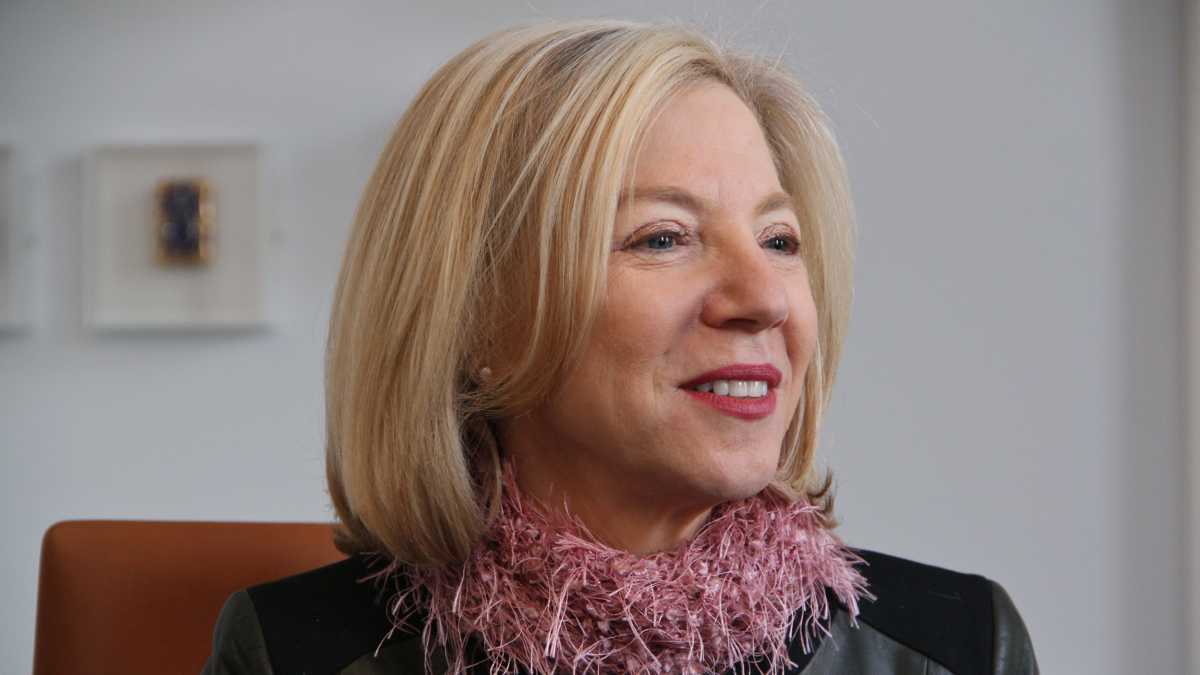Penn grad students await decision on move to unionize

University of Pennsylvania President Amy Gutmann wrote to graduate students in March, asking that they not support the move to form a union. (NewsWorks file photo)
The National Labor Relations Board newly constituted by President Donald Trump could doom a unionization effort at the president’s own alma mater.
The NLRB chairman, named by Trump, is an outspoken critic of graduate students forming unions. And the president has chosen two other management-friendly members to sit on the five-seat panel, meaning Republicans will soon have a majority on the board.
This reorganization comes a year after the board overturned a 13-year precedent and declared that graduate students are employees of private universities, enshrining them with the right to unionize. In response, graduate students at the University of Pennsylvania and more than a dozen other private schools took steps to form unions.
The board’s decision last fall came after graduate students at Columbia University filed a petition seeking recognition of their union in order to allow them a voice in deciding their pay, benefits and how they can best manage demanding workloads.
“It is possible, in the next year or two, that the Columbia University decision could be overturned,” said William Herbert, who studies unions at Hunter College in New York.
And that could spell bad news for the Penn graduate students’ petition, which is now awaiting a decision from the regional NLRB in Philadelphia.
If the regional director allows the unionization effort to go forward, Penn administrators — who have steadfastly opposed the union push — could appeal to the national board. Many labor observers say that could render moot any pending efforts on behalf of graduate students to form unions.
Danielle Hanley is an activist with Get Up (Graduate Employees Together at the University of Pennsylvania), the group advocating for graduate students at Penn to organize. The doctoral candidate in political science at Penn would not speculate about whether the new makeup of the national board will unravel Get Up’s efforts. She said say, however, that if national labor officials call for a union vote, university officials do not have to challenge it.
“Penn could allow us to go ahead and exercise our right to collectively bargain. They could recognize all the hard work that we’ve been doing as of late,” Hanley said.
Besides winning a seat at the table to negotiate pay, workload and other issues, Hanley said collectively bargaining a contract for graduate students can start a discussion over health insurance coverage.
Hanley said she also sees a union as a way to address the grievance filing process at the university, which she said is now biased since university officials have the final say.
“At the end of the day, these things affect our ability to do our work well,” Hanley said.
A Penn spokesman did not return a request for comment.
In March, Penn President Amy Gutmann wrote a letter to graduate students asking that they not support the move to form a union.
“The costs and constraints that accompany unionization could readily detract from and diminish the collegial capacity of Penn students and faculty members to advance their scholarship and achieve their valuable educational and professional goals,” Gutmann wrote.
A group of students resisting the union, No Penn Union, argued that costly union fees will not resolve graduate student academic disputes and that organizing would concentrate power in the union, diminishing the voice of individual schools at Penn.
Herbert at Hunter College said the issues of whether graduate students at private universities are employees who deserve to be protected against retaliation — and if school officials are required to engage in collective bargaining with graduate students — have long been unresolved.
“These have been issues in a variety of cases dating back to the early 1970s,” Herbert said.
A decision from the regional director of the NLRB on whether Penn graduate students’ union petition can advance is expected in the coming weeks. Penn officials are expected to ask the national board to review the decision if it favors a union vote. By that time, the new Republican-majority may be in place and could have established a new precedent.
WHYY is your source for fact-based, in-depth journalism and information. As a nonprofit organization, we rely on financial support from readers like you. Please give today.




